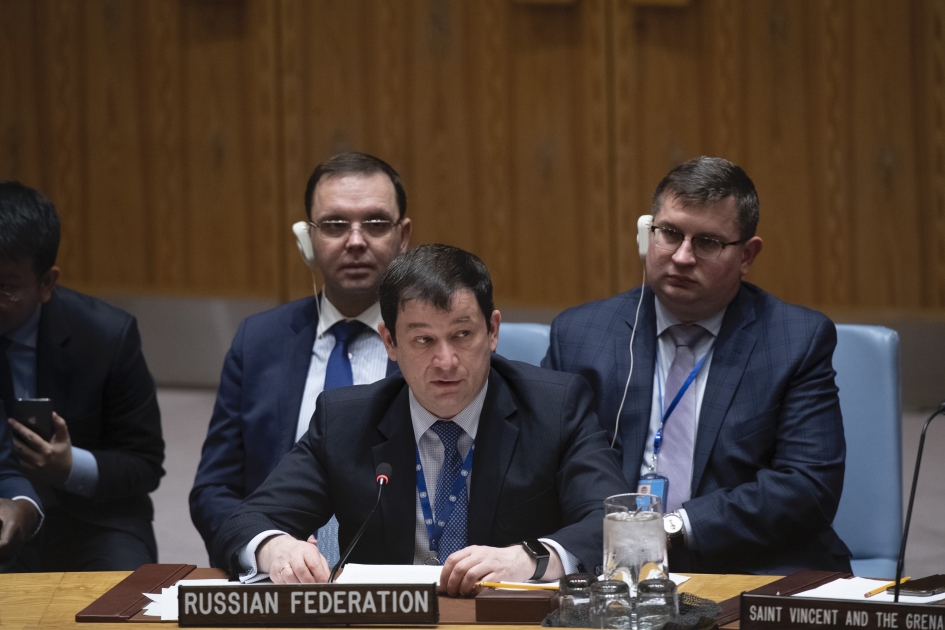Statement by Permanent Representative Vassily Nebenzia at a UN Security Council Meeting on Colombia
Distinguished Mr. President,
We thank you for the initiative to honor the memory of the victims of the earthquake in Haiti and of the terrorist attack in Niger with a minute of silence that we have had before the beginning of this meeting.
We mourn together with our colleagues. Let me express condolences to our Nigerien friends.
We welcome personal participation of Minister of Foreign Affairs of Colombia Claudia Blum in this meeting. May I avail of the opportunity and congratulate you on your appointment to this responsible office and express hope that Colombia be subject to discussions at the Security Council only in a positive way.
We also thank Special Representative of the Secretary-General Carlos Ruiz Massieu for his presentation of the report. As we infer from this document, the Security Council and the Secretary-General agree that success of the peace process fully depends on the ability of Colombians to meet their commitments under the historic Final Peace Agreement.
Colombia has stepped into a crucial stage that will define how sustainable peace is going to be that Colombians paid such a high price to achieve. As the Secretary-General rightly stated in his report, the Final Peace Agreement stipulates a long period of post-conflict recovery, however the solid groundworks for peace need to be laid down now.
That is why the Security-Council that is authorized to control the Colombian settlement, closely follows the developments and hopes Colombia will be able to keep and build on the success that has been achieved thanks to the Final Peace Agreement.
Mr. President,
The Verification Mission plays a very important role. However, the main responsibility for the peace process by all means rests on Colombians. As we see from the report, despite some progress, the most part of the work to consolidate peace still lies ahead.
Since the Final Peace Agreement was signed, it has been obvious that the Colombian peace process is characterized both by emerging challenges and basic tasks that remain in place and require being urgently addresses. Thus, even though the October elections were “more peaceful than the previous ones”, the Secretary-General highlights growing mistrust in various stratas of the community. There are several reasons for that.
One of them is the lack of solutions to security-related issues. The year 2019 witnessed the greatest number of victims ever since the Final Agreement was signed. We proceed from the assumption that every killing must be investigated and the guilty must be held accountable.
The report also addresses “gaps” in political reintegration. In particular, one of parliamentary seats remains “temporarily blocked”, as under the Final Agreement it belongs to the party “Common Alternative Revolutionary Force” rather than to a concrete representative.
There is public demand for bringing up effectiveness of social and economic reintegration. The report reflects that broad public discontent is the reason for lacking progress in implementing agricultural reforms, including at the track of reintegration and crop substitution programs.
As for the legal reintegration, over the report period, state programs have not issued accreditation to any new members, though such applications were coming in.
The Security Council always insists on preserving the independence of the Special Jurisdiction for Peace. We cannot but be concerned by the information contained in the report that lawyers who appear for former combatants at court receive life threats. No matter, who might be the source of such threats, we deem it as an attempt to put pressure on justice. Such practice must stop immediately; all such cases must be investigated and the guilty held accountable.
Let me make a separate point about the report’s information that communes and organizations of the civil society that are touched upon by the activity of the “National Liberation Army” insist that they need to have dialogue with this group.
We agree that a truly sustainable peace in Colombia is hard to imagine without due account for the whole range of opinions. We hope Bogota will find an opportunity to resolve disputes with Cuba with regard to the NLA negotiators who are there at the moment. We share Havana’s position that they cannot be delivered, because then Colombia would not be able to ensure their immunity, as required by the “guarantee protocols” that the sides signed to regulate their acts in case dialogue fails.
Just like all others who studied the report, we are worried by the tide of protest. We are convinced that it is only effective implementation of the Final Peace Agreement that can calm down the people and prevent everyone from getting back to arms. It is the Agreement and its central element, the Special Jurisdiction for Peace, that made it possible for the Security Council and the Secretary-General to maintain the peace process.
It is our unfailing belief that stabilization can be achieved only with peaceful means through maximum broad public dialogue.
This is the approach that is embodied in resolution 2282 that says that national responsibility for keeping peace suggests that the government should account for the opinions of all segments of the society.
Therefore we hope that the initiatives aimed at establishing a broad national dialogue that were articulated by the President and the community will yield fruit. What is the most important is to avoid duplicating efforts.
We commend commitments to peace proclaimed by the leadership of Colombia, however we call not to stop at this point. The international community, the UN and its Security Council, and, most importantly, the people of Colombia expect that the obligations under the Final Agreement will be strictly observed. Otherwise, it will be impossible to overcome effects of a half-century-long armed conflict.
We expect that the UN Verification Mission in Colombia will continue playing a significant role in the country’s peace process.
Thank you.
